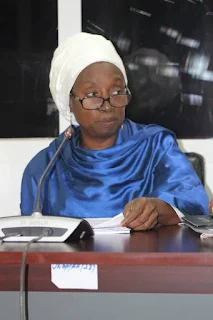t.com/img/b/R29vZ2xl/AVvXsEhY5DZliFRQv41VgwHElhLq_xMR5eTADFRT9TOsbab5OUSQcgIOyAo045D8pAGK-1dyhyphenhyphentT4dK_Yj1XJxu6O9Dt1UiC_vGFqAWYVkZRzmN4fp_X5sYnuQZb5PzjUsech0E4y9q4UOIoiJKNp-qOMeMfup4AeVqAjBZs9-k8ZvcEnrD7EzZHTA0CoQ7xY4k/s960/IMG_1214.JPG" style="display: block; padding: 1em 0; text-align: center; ">
.
After watching tonight's episode of the Bantaba on Kerr Fatou, I was nearly moved to tears for a nation so consumed by a quest for truth, that finding it at whatever means, suddenly breeds a misconception of the very ideals of truth and fact finding.
In the quiet desperation of a nation still grappling with its past, a belief is spreading like wild fire that if Alhagie Kurang and Amie Bensouda end up in court, the truth about the Janneh Commission and Jammeh’s looted assets will finally come to light.
It is a compelling idea. But it is also deeply misguided and misleading.
Courtrooms do not exist to reveal the whole truth. They exist to test specific claims. What was said, what was done, and whether it violated the law. If Bensouda sues Kurang, or vice versa, what will be examined is that dispute and not the integrity of the entire Janneh Commission, not the fate of Jammeh’s assets, and most certainly not the unanswered questions the nation still carries.
This legal clash, if it comes, will not give us a national reckoning. It will not answer why there has been no full public audit of recovered assets, or why recommendations still gather dust. The courtroom cannot shoulder what our institutions have refused to carry.
To place our hopes for truth in a trial between two individuals is to ask a scalpel to serve as a mirror. It will cut precisely, but only where directed. The broader truth, that of complicity, silence, and evasion solidly remains outside its reach.
If we are to make sense of the Janneh Commission, its purpose, its limits, its legacy, we must go beyond personalities and legal filings. We must demand accountability from those who hold the reins of state power today. We must insist on transparency, not just in court, but in cabinet meetings, National Assembly sessions, and public reports.
We must elevate our national conversation beyond rumors and rivalries.
Because if we continue to place the weight of our truth-seeking on the shoulders of individual conflict, we will always be disappointed. The courtroom will close, the ruling will come, and we will find, once again, that the real questions remain unanswered.
The truth we seek is not in a defamation case or a public spat. It is in our refusal to forget. It is in our insistence that national memory be respected. It is in our courage to say that commissions are not enough, and that justice delayed, distorted, or diluted is justice denied.
If we want answers, we must demand them not from a court case, but from our government, our parliament, our civic spaces. We must understand that justice does not live in legal drama,it lives in public accountability.
Until then, we risk mistaking sparks for sunlight, conflict for clarity and the truth we so desperately seek will remain just out of reach.
M R R.



















